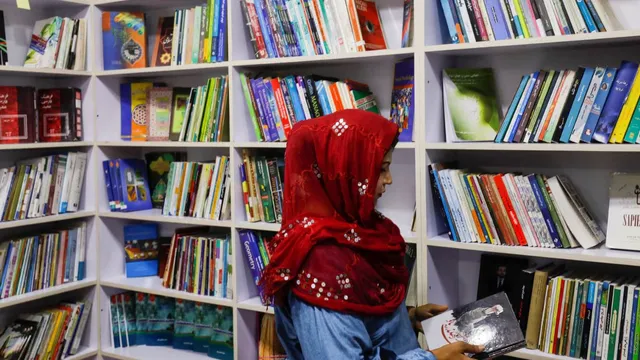- By Supratik Das
- Sat, 20 Sep 2025 12:41 PM (IST)
- Source:JND
Taliban banned women authors: In a dramatic step that has sparked global outrage, the Taliban regime in Afghanistan has prohibited 680 books in universities, among them 140 by female authors, on the basis that they are "anti-Sharia" and "anti-Taliban." The move also targets books on human rights, sexual harassment, and other topics incompatible with the regime's view of Islamic law.
Among the books proscribed are Safety in the Chemical Laboratory, as well as books that deal with sociology, journalism, law, and development studies. Six of the eighteen courses dropped at the university are specifically about women and include Gender and Development, The Role of Women in Communication, and Women's Sociology.
Restrictions Target Women's Voices
“All books authored by women are not allowed to be taught,” a Taliban official told BBC Afghan. The move comes amid a broader effort to reshape the curriculum along lines considered compatible with Afghan culture and Sharia principles.
Zakia Adeli, ex-deputy minister of justice prior to the Taliban's re-emergence in 2021 and writer of Political Terminology and International Relations, explained that she was not surprised at the ban. "With the experience of the Taliban since their return four years ago, a shift in the curriculum was expected," she said in a statement to BBC Afghan. Adeli continued that the censorship of women's writings is part of the regime's long history of misogynistic policies.
Impact On Higher Education
Taliban Ministry of Higher Education Deputy Academic Director Ziaur Rahman Aryubi reiterated the ban in a letter to universities, saying a committee of religious scholars and experts reviewed all the textbooks for ideological, cultural, religious, and scientific conformity with Sharia law.
The ban has created significant challenges for universities:
• One professor at Kabul University, who wished to remain anonymous, stated to BBC Afghan that the ban on Iranian authors' works, numbering 310 of the banned books, cuts off a vital connection to the international higher learning community.
• Lecturers are now forced to prepare textbook chapters themselves, within the guidelines set forth by the Taliban, and there are worries regarding the quality and thoroughness of instruction.
• Students and teachers are left with an uncertain future as core subjects like human rights, sociology, and women's studies are effectively removed from the curriculum.
• The step may have far-reaching consequences for the nation's growth, world interaction, and gender balance.
Wider Restrictions On Women
The ban on women writers comes after a series of prohibitions since August 2021, when the Taliban returned to power. Women are being prevented from attending school past the sixth grade, and midwifery programs were covertly shut down in late 2024, removing one of the last remaining avenues for professional education. The regime recently also limited fibre-optic internet access in ten provinces on moral grounds.
ALSO READ: Afghanistan Internet Ban: Taliban Restricts Wi-Fi Access Across Country; What's Behind Bizarre Move
The Taliban insist that these policies uphold women's rights as part of Afghan culture and Islamic law. Their critics say that such policies undermine greatly academic freedom and shut women out of intellectual discussions.

